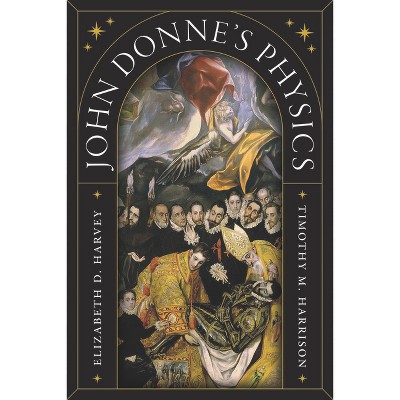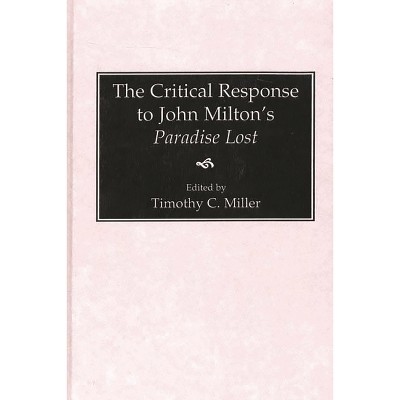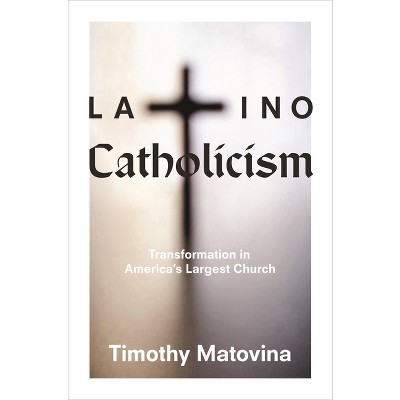Sponsored

Coming To - by Timothy M Harrison (Paperback)
$32.00
In Stock
Eligible for registries and wish lists
Sponsored
About this item
Highlights
- In Coming To, Timothy M. Harrison uncovers the forgotten role of poetry in the history of the idea of consciousness.
- About the Author: Timothy M. Harrison is assistant professor of English at the University of Chicago.
- 328 Pages
- Literary Criticism, European
Description
About the Book
"In "Coming To," Timothy Harrison reminds us of the forgotten role of poetry in the history of the idea of consciousness. Drawing our attention to a sea change in the English seventeenth century, when, over the course of a half century, "conscience" made a sudden shift to "consciousness," he traces a line that leads from the philosophy of Renâe Descartes to the poetry of John Milton, from the prenatal memories of theologian Thomas Traherne to the unresolved perspective on natality, consciousness, and ethics in the philosophy of John Locke. Harrison shows how each of these figures responded to the importance accorded the first-person perspective and their views of the origins of how human thought began. Taken together, the writings of this unlikely group of thinkers sheds new light on the emergence of the concept of consciousness and the meaning of human natality. It will be read by literary scholars, philosophers, and historians of science alike"--Book Synopsis
In Coming To, Timothy M. Harrison uncovers the forgotten role of poetry in the history of the idea of consciousness. Drawing our attention to a sea change in the English seventeenth century, when, over the course of a half century, "conscience" made a sudden shift to "consciousness," he traces a line that leads from the philosophy of René Descartes to the poetry of John Milton, from the prenatal memories of theologian Thomas Traherne to the unresolved perspective on natality, consciousness, and ethics in the philosophy of John Locke. Each of these figures responded to the first-person perspective by turning to the origins of how human thought began. Taken together, as Harrison shows, this unlikely group of thinkers sheds new light on the emergence of the concept of consciousness and the significance of human natality to central questions in the fields of literature, philosophy, and the history of science.Review Quotes
"Coming To makes a significant contribution to scholarship not least because it opens up the unexplored topic of birthing consciousness in early modern poetry and brings attention to the relatively under-appreciated Traherne. Perhaps more importantly, it is a refreshing update on methods formerly known as the history of ideas."--Mary Helen McMurran "The Scriblerian and the Kit-Cats"
"Timothy M. Harrison's first and now essential book. . ."--Brett DeFries "Philological Quarterly"
"Harrison's Coming To largely deals with Locke's philosophy but much more generally with little-discussed cultural issues surrounding the rise of empiricist and Cartesian philosophy. . . . Harrison's many unusually insightful connections in discussing these largely neglected topics make for a fascinating read."--Catherine Gimelli Martin "The Year's Work in English Studies"
"In Coming To, Harrison establishes the fundamental importance of poetic creation to the nascent early modern concept of consciousness . . . Harrison makes the case for poetry's pressing relevance to how we think today."--Tessie Prakas "Genre"
"Harrison's Coming To pulls off the impressive feat of being both highly ambitious and methodologically meticulous. It looks to give a new account of the emergence of the idea of consciousness. . . . Harrison's literary readings are acute, and his deployment of sources and antecedents across disciplines is resonant and heterogeneous. Inevitably in such a rich and varied study, some connections and correlations seem tighter than others. But Harrison expresses the hope that his unusual conjoining of Milton, Traherne, and Locke will come to seem sensible, and this is the least of his achievements in a volume that is full of interest and vitality."--Emma Gilby "Isis"
"Joining a growing wave of scientifically minded studies of Renaissance literature, Harrison finds real conceptual work in literature. As the shadow of STEM looms over the humanities, Harrison's book is a timely reminder that literary scholarship can historically analyze scientific concepts without sacrificing its distinctive concerns for value and form. In fact, he shows the mimetic, particularizing character of literature to be a prerequisite for consciousness to emerge at all. . . . Coming To is a signal contribution to Milton studies and perhaps a watershed in the history of Traherne's fortunes. . . . Harrison's remarkable book lends history to, yet delicately preserves, what we might call the last miracle."--Nathaniel Likert "Modern Language Quarterly"
"The idea that Eden was a place of discovery from the start is also the motivating insight of Harrison's Coming To. Before Milton's time, Harrison argues, 'consciousness' was a moral faculty, interchangeable with what God in book 3 of Paradise Lost calls 'my umpire conscience, ' 'place[d] within' fallen humanity 'as a guide.' . . . Milton's--and Harrison's--minute attention to the fashioning of each blank verse line pays off in startling insights into the texture of what Milton's contemporaries were just beginning to call consciousness."--Catherine Nicholson "New York Review of Books"
"Whereas previous scholarship understands the concept of consciousness as an invention of philosophers, Harrison challenges existing paradigms that place consciousness studies elsewhere, identifying the necessity of poetry in the development of consciousness. Coming To provides rich historical contextualization toward the book's aim to not only identify the connection between natality and consciousness, but also point toward the social and political implications of that connection. . . . The objective of the book is to identify the intertwined nature of consciousness and natality so as to place consciousness studies within poetry and literary studies, which Harrison accomplishes wonderfully. Any students of philosophy, history, or early modern literature will find this book useful. Harrison's book will undoubtedly become a staple text within childhood or women's studies for scholars interested in the history of consciousness in relation to infancy and motherhood."--Shelby N. Oubre "Renaissance Quarterly"
"Insightful... Coming To follows a doubled trajectory: insisting on poetry's embeddedness in the history of consciousness and narrating the emergence of consciousness as fundamental to the development of early modern poetry. Harrison brings to life this entanglement through subtle, close readings of the early modern poets Thomas Traherne and John Milton, and the philosopher John Locke, all situated within their shared cultural matrix... Harrison's book will be of interest to scholars of Renaissance literature, religion, and philosophy, particularly in the areas of experiential spirituality, devotional writing, and embodiment. Additionally, Coming To contributes to our understanding of the entwined early modern discourses of subjectivity, consciousness, and identity."--John Yargo "Renaissance and Reformation"
"Harrison is a comprehensive scholar. . . . The arc of consciousness and its history is so wide that Harrison comes close to becoming an intellectual polymath as he leads the reader through his book. I have already found myself returning to it more than once."-- "Sun News Tuscon"
"This is an important work that scholars will want to return to often. . . . Summing Up: Highly recommended."-- "CHOICE"
"Harrison is an acute student of philosophy, an erudite guide to intellectual history, and a sensitive and revelatory reader of poetry. As in the very best studies of poetry and its intellectual contexts, Harrison demonstrates that poets do not merely reflect philosophical developments, they also shape them. In Coming To, Harrison, tracing a line from Descartes through Milton and Traherne to Locke, unearths the contribution of two poets to modern understandings of consciousness."--Stephen M. Fallon, Cavanaugh Professor of the Humanities, University of Notre Dame
"Harrison argues that the notion of consciousness emerged over the course of the seventeenth century by being connected with another concern: natality, the earliest, infant experiences of existence, beginning in the fetal state. This is original scholarship and thought, immensely and accurately learned, impressive in every way, and is likely to become a standard in the field of seventeenth-century studies, on a shelf with Martz, Lewalski, and Colie. I have read few books in a long time that are as technically accomplished and that strike me as not only interesting but also as important."--Gordon Teskey, Harvard University
About the Author
Timothy M. Harrison is assistant professor of English at the University of Chicago.Dimensions (Overall): 9.0 Inches (H) x 6.0 Inches (W) x .72 Inches (D)
Weight: 1.02 Pounds
Suggested Age: 22 Years and Up
Number of Pages: 328
Genre: Literary Criticism
Sub-Genre: European
Publisher: University of Chicago Press
Theme: English, Irish, Scottish, Welsh
Format: Paperback
Author: Timothy M Harrison
Language: English
Street Date: September 22, 2020
TCIN: 1006096994
UPC: 9780226725123
Item Number (DPCI): 247-40-4982
Origin: Made in the USA or Imported
If the item details aren’t accurate or complete, we want to know about it.
Shipping details
Estimated ship dimensions: 0.72 inches length x 6 inches width x 9 inches height
Estimated ship weight: 1.02 pounds
We regret that this item cannot be shipped to PO Boxes.
This item cannot be shipped to the following locations: American Samoa (see also separate entry under AS), Guam (see also separate entry under GU), Northern Mariana Islands, Puerto Rico (see also separate entry under PR), United States Minor Outlying Islands, Virgin Islands, U.S., APO/FPO
Return details
This item can be returned to any Target store or Target.com.
This item must be returned within 90 days of the date it was purchased in store, shipped, delivered by a Shipt shopper, or made ready for pickup.
See the return policy for complete information.
Trending Poetry

Bestseller
$22.89
was $24.48 New lower price
Buy 2, get 1 free select books
4.6 out of 5 stars with 52 ratings




$9.85 - $23.09
MSRP $15.99 - $32.99
Buy 2, get 1 free select books
4.8 out of 5 stars with 147 ratings

$20.58
MSRP $30.00
Buy 2, get 1 free select books
5 out of 5 stars with 6 ratings





